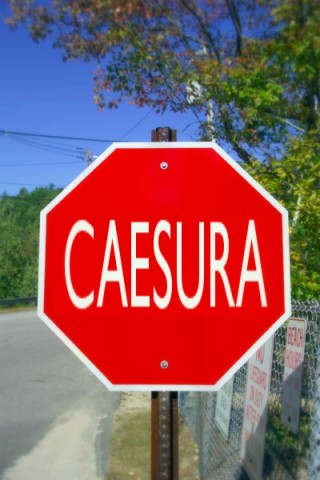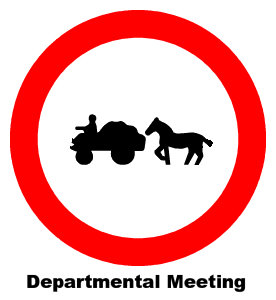Submitted Poems
boy with stik
Ross Fleming
What is it about little boys and sticks? – Carol Smith (kindergarten teacher)
i am starting to think
that i am invinncibel
as i stand here
the univers befor me
all of you croching, afraid
as i waive my weapon
meybe i am the conductor of my
very own orkistra
if you are wys you will
listen to me and obay my comands
if you don't i think
i shall send all rebles to
a consintrashun camp
where the shirkers will
be tortored
wham! do you here me
it is veri impotent wot i hav to say
if you do not listen the furst time
i will stik this into you
until you cry or shoot you
dead bang this stik
in my rite hand comtrols
evrything
wotch out!
god is my friend not yours.
Cæsura [What might we get if we asked a poet to write a ‘STOP’ sign?]
Michael Rolfe

Picture-Poem: Departmental Meeting I
Michael Rolfe

Picture-Poem: Departmental Meeting II
Michael Rolfe

Thank you for choosing our software [Is there any day job particularly well-suited to a poetic mind?]
Michael Rolfe

Found poem: A problem has occurred [Is there any day job particularly well-suited to a poetic mind?]
Michael Rolfe

Open Book Festival
Michael Rolfe
Grouchy, grumpy André Brink
crossly crosses the Fugard foyer,
led and supported by his latest succulent young wife.
Can he be going to the Ingrid Jonker prize-giving?
[Compose a question, in the form of a poem, for John Maytham’s rapid fire general knowledge quiz.]
Michael Rolfe
"A plague on both your houses!"
Whose houses were these?
Which was Romeo's? Which Juliet's?
Ask for whom tomorrow, and you shall find him a grave man?
Who killed him?
How big was his wound?
What does "FIAT" stand for?
What is fiat money? Is "Fiat lux" a luxury Italian car?
Which was Mary's fiat?
Which March 1970 Beatles song tops "The Fans' Top 10" poll?
Is the pope Polish?
Which is the only nation to have retained the FIFA World Cup?
[How do you respond to doors that say ‘PUSH’ or ‘EXIT’?]
Michael Rolfe
From Terry Pratchett’s opera book, Maskerade:
Questa maledetta porta si blocca
Si blocca communque diavolo lo faccio!…
This damn door sticks, this damn door sticks.
It sticks no matter what the hell I do.
It is marked “Pull', and indeed I am pulling.
Perhaps it should be marked “Push”?
“This isn’t real life. This is opera. It doesn't matter what the words mean.”
People’s Sign
Keith Edwards
In New York in 1980,
greedy flâneur,
‘doing’ the city,
hungry for sights,
each one required to out-top
the last,
I saw in SoHo district,
a sign –
a wonder:
‘UNNECESSARY NOISE PROHIBITED’
What faith in The People! –
their fine-distinction faculty –
to choose between essential
and other noise-making needs.
Dear anonymous borough-sign author:
you could have been kinder,
made it easier to obey;
why not
‘NECESSARY NOISE IS OK’
FOUND POEM
Keith Edwards
Extract from a report in the The Times, Friday 28 September 2012, about six people who died after eating wild mushrooms.
KZN DECLARES WAR ON MUSHROOMS
KZN Government & eTHEKWINI Muncipality have
declared war
on wild mushrooms.
We took a decision
to launch
an offensive campaign
to destroy
wild
mushrooms.
Meteorology Rap [Is there any day job particularly well-suited to a poetic mind?]
Michael Rolfe
Meteorology
is expensive technology
with a lot of fakes
but when it breaks
you need someone to gaze out the window.
Get a poet; they’re cheap.
2012
Sihle Ntuli
In 2012 “Making a living” is not just breathing and existing,
Profits are called “killings”
Madmen in suits are the rulers;
I wonder how they measure up to those who liberated us,
2012, the year of civil war against the weave, scissors and clippers in the war against RELAXer!
Odd how in 2012 even airheads are on television
Heads are in the air I only see their bodies,
The passion left while the self-centered, “get that money right” was made up
the love runs down and out,
Massacres of the working class is the script that Karl Marx
Through crosses with red ink
Send an S.O.S at the thought; this year is not yet over.
Thursday
Sihle Ntuli
Of the hair
Untied
Loosened ties
On necks
Left there
Dry throats
What a weak
Its thirstday
Before the lie runs down
Make-up still intact
Looking unbelievable
Friday’s Eve
Adam’s week
Resistance is futile
…They shall give in soon
Jasmine Brings the Spring
Jeannie Wallace McKeown
From the first scenting,
sighting of pink buds and white
flowers, we can say:
Spring is here.
Not an indigenous declaration
but a Chinese varietal, this
sweet-scented flower.
I imagine
an explorer
bewildered and entranced by
the sights, sounds, clamours
of the Emperor’s domain, taking
tea in tiny, bowl-shaped cups,
gathering spices, fruits, silks,
precious jade, gleaming lapis.
I see
a carefully plucked bloom
pressed
between journal pages,
an evocative memento of
an Eastern journey.
Perhaps, sometime later
in the heat and the dry
dust of South Africa,
this explorer let drop
those blooms which
fell
took root,
flourished in this new homeland.
Learning, in time,
to herald
our antipodean Spring.
Stains Fill the Cracks
Christine Biles
Blood on the pavement
glistens in the road lights,
shines like a medal
- but not one of honour.
The lights are cold,
up above,
on their tall posts.
Distant,
yet they reveal
the harshly intimate truth:
She is dead.
The blood,
once hers,
now glues her to the pavement;
the delicately cracked,
weathered pavement;
the pavement that countless
cars, thousands of people,
drive over every day;
the pavement that no one
knows as well as her.
The blood,
once hers,
dries each hair on her head
to the dusty cement,
connects her skin
to the man-made stone
until it cracks as if
-but not
with old age,
like sun-dried
desert mud:
peeled beack,
reaching up.
The blood,
once hers,
fills the cracks,
makes the pavement whole
once again.
It will be washed away
tomorrow
with the winter rains.
She is dead,
in the cold light
of the distant lampposts,
for all to see
if they happen to glance her way.
A white sheet has been placed
over her body –
a stark contrast
to the red of the blood.
It’s as if they want
us to believe
that she is a white angel
laying there on her back,
legs spread,
arms resting out, away
from her sides.
But she is no angel.
Angels do not often fall
from Heaven.
Those black hands
sticking out the sides
of the sheet
are human.
And she didn’t die
from a fall.
She died from a car,
from a driver who didn’t care;
from a driver who drives over
that cracked and weathered
pavement every day;
from a driver who does not
- never will
know that pavement
like she knows it now;
from a driver who does not
- now, never will
know her,
who will drive over her blood,
soaked into the cracks
of the man-made stone,
tomorrow morning.
Until the winter rains come
and wash it all away.
Lost Words
Christine Biles
The concrete step I sit on makes my butt hurt.
I sip a chai latte alone in the sun
because I am cold.
A small bee wants some of my sweet drink
and disturbs my peace with its threatening buzz,
with its uncertain way of flying:
slow and hovering here, quick and aggressive there.
The sun is too bright to keep my eyes open.
I let the bee enter the small oval hole in the lid,
then allow the skin shades to slip closed,
locked by the fine zipper of eyelashes.
The sun warms me, so I think.
There is now no buzzing to draw my attention away –
away from what?
What is it, exactly, that I should be paying attention to?
The trees that never lack their leaves
standing still on this windless afternoon?
The few long, stretched,
tired clouds,
reaching across the sky, from mountain to mountain,
growing increasingly yellow, golden, orange?
There is a rustling sound,
an even rustling, purposeful,
yet slow.
Louder, coming closer.
There are words,
hushed, whispered, exhaled.
Louder, coming closer.
Louder.
Coming closer.
Louder.
Coming closer.
I open my eyes.
A black man
dressed in a teal cover-all
with the number 237 stitched to the arm,
like a prison uniform,
is sweeping the steps, evenly, purposefully,
yet slowly.
He comes closer
working on the step below the one on which I sit.
He does not look at me, though I watch his face,
the pock-marked cheeks,
the frizzy black beard,
the left eye that does not sit straight.
His lips move quickly,
as though he had only a moment
to relay a meaningful message,
as though he could see his death coming
closer every second
and felt the deep necessity to tell
his life story to anyone who will listen.
There is no one here to listen,
except me.
But he speaks not to me,
he doesn’t even speak to the ground,
or to his broom, which at least whispers back
in its own way.
He speaks to the people within his mind,
those of – or altered by – his imagination.
I look at him
as he looks
at his own people.
He sweeps,
I watch,
He speaks,
I listen
to insensible words
of an entirely different language.
He finishes sweeping the step
below the one on which I sit,
then moves on
to the next one down.
He works his way away,
becoming fainter,
until his words are lost.
The rustling slowly sweeps itself away.
This is how he leaves me:
evenly, purposefully,
slowly.
I decide I must leave him,
rear-end protesting as I stand.
One last glance back:
His lips still move,
His eyes still look
intently.
But his words
are lost.
Feedback
My instruction was: write any poem that leads on from the idea of poets composing street signs. Michael Rolfe must have smiled when he turned over his exam paper to see this rubric. I certainly laughed at his poetic stop sign ('Caesura') and 'Departmental Meeting' hazard signs.
I also liked Keith Edwards' poem in response to the sign he saw in New York in 1980 which read 'Unnecessary noise prohibited':
What faith in The People! –
their fine-distinction faculty –
to choose between essential
and other noise-making needs.
Keith Edwards and Michael Rolfe both have that absolutely necessary poetic skill of being ever-alert, en garde, on the qui vive wherever they are and whatever they're doing or reading. Poems come to these nightwatchmen of poetry. I loved Keith's 'KZN DECLARES WAR ON MUSHROOMS' and Michael's wicked 'Open Book Festival', his found poems ('Thank you for choosing our software' and 'A problem has occurred'), and his response to the challenge to create a poem that poses a question for John Maytham's rapid fire general knowledge quiz. He also imagines the ideal day job for a poet: meteorology, since when those instruments fail, 'you need someone to gaze out of the window'.
I was struck by the tone of Sihle Ntuli's economical poem 'Thursday' -- its attenuated form and the spare images ('untied'; 'loosened') conveying exhaustion and surrender. She is much more satirical and cutting in '2012', with its pointed speculation:
Madmen in suits are the rulers
I wonder how they measure up to those who liberated us.
Two poems by Christine Biles show again her aptitude for paying attention, for revealing detail. 'Stains Fill the Cracks' adopts a slow, ceremonial tone for the death of a motor accident victim. I didn't like the didacticism of the second last stanza, though: always give the reader the freedom to make connections, to detect the hidden message. Never tell the reader how to feel. Both here and in her 'Lost Words' poem, there is a problem of length. Again, it might be better not to spell everything out to the reader. Some of the last stanzas come across as chopped up prose, which is a pity when this is a poet capable of intricate sound patterning and suggestiveness:
There is a rustling sound,
an even rustling, purposeful,
yet slow.
Louder, coming closer.
There are words,
hushed, whispered, exhaled.
Louder, coming closer.
Louder.
Coming closer.
Louder.
Coming closer.
I liked Jeannie Wallace McKeown's imagining of how jasmine first took root in South Africa. I would lop off the first two stanzas, though, and start with 'I imagine/an explorer'.
My students complain that I'm always telling them to chop off the first stanza. Obviously that's not true, but it is sometimes the case that the first stanza or two are a kind of warming up exercise, a preliminary garbage collection of the mind. Sometimes we use the opening stanza - mistakenly - to tell the reader what the poem is about. Poor reader, to get a spoiler in line one.
 SLiPStellenbosch Literary Project
SLiPStellenbosch Literary Project 




